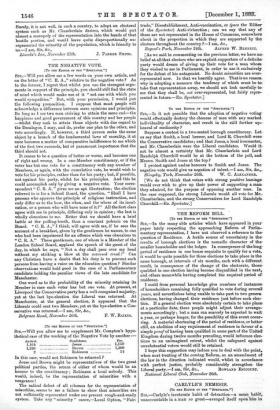THE NEGATIVE VOTE.
[TO THE EDITOR OF THE "SPECTATOR.']
Srn,—Will you allow me a few words on your own article, and on the letter of "C. R. A.," relative to the negative vote ? As to the former, I regret that whilst you use the strongest argu- ments in support of the principle, you should still find the state of mind which would make use of it "not one with which you would sympathise." But, with your permission, I would put the following proposition. I suppose that most people will acknowledge a difference between mere opinions and principles. So long as I see two men striving to attain the same end—the happiness and good government of this country and her people —whilst they seek to attain those objects with due regard to the Decalogue, I may, and do, prefer one plan to the other, and vote accordingly. If, however, a third person seeks the same object by a breach of the fundamental laws of morality, it at once becomes a matter of comparative indifference to me which of the first two succeeds, but of paramount importance that the third should not.
It ceases to be a question of better or worse, and becomes one of right and wrong. In a one-Member constituency, or if the voter has but one vote for a constituency with any number of Members, or again, with the cumulative vote, he would wish to vote for his principles, rather than for his party ; but, if possible, not against his party, whilst for his principles. And this he could accomplish only by giving a negative vote. Your corre- spondent" C. R. A." gives me an apt illustration; the election referred to is for a School Board, the question, "Shall I have persons who approve the principle of religious instruction, and only differ as to the how, the when, and the where of its incul- cation, or a person who will have none of it ?" All the first class agree with me in principle, differing only in opinion ; the last is wholly obnoxious to me. Better that we should have a brief battle at the polling-booth, than a constant polemic on the Board. "C. R. A.," I think, will agree with me, if he sees the account of a breakfast, given by the gentlemen he names, to one who had been imprisoned for an offence which was obnoxious to "C. R. A." These gentlemen, one of whom is a Member of the London School Board, applaud the speech of the guest of the day, in which he says, "Not a day shall pass over my head without my striking a blow at the accursed creed !" Can any Christian have a doubt that his duty is to prevent such persons from having a voice on the education question ? Similar observations would hold good in the case of a Parliamentary candidate holding the peculiar views of the late candidate for Manchester.
One word as to the probability of the minority retaining its Member in case each voter has but one vote. At present, at Liverpool the Conservative party has a well-recognised majority, yet at the last bye-election the Liberal was returned. At Manchester, at the general election, it appeared that the Liberals could seat two Members, yet at the bye-election a Con- servative was returned.—I am, Sir, &e., Belgrave Road, November 261h. F. W. BLAMES.






































 Previous page
Previous page